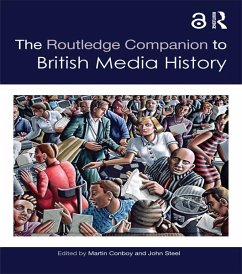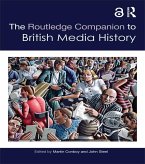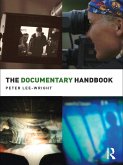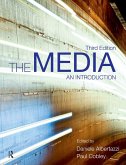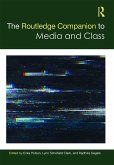The 50 chapters in this volume, written by an outstanding team of internationally respected scholars, bring together current debates and issues within media history in this era of rapid change, and also provide students and researchers with an essential collection of comparable media histories.
The Routledge Companion to British Media History provides an essential guide to key ideas, issues, concepts and debates in the field.
Chapter 40 of this book is freely available as a downloadable Open Access PDF under a Creative Commons Attribution-Non Commercial-No Derivatives 3.0 license. https://www.routledgehandbooks.com/doi/10.4324/9781315756202.ch40
Dieser Download kann aus rechtlichen Gründen nur mit Rechnungsadresse in A, B, BG, CY, CZ, D, DK, EW, E, FIN, F, GR, HR, H, IRL, I, LT, L, LR, M, NL, PL, P, R, S, SLO, SK ausgeliefert werden.
- James Curran, Professor of Communications, Goldsmiths, University of London, UK
"This impressively comprehensive compilation of essays on British media history comprises 50 essays by a wide range of scholars from universities throughout the UK. More than a typical historical analysis, the book problematizes (in Karen Weekes's definition) media history in considering whether media are a cause or a symptom of a larger cultural phenomenon. This cultural contextualization and interdisciplinary approach to media history offers an invaluable contrast to the more economically induced pressures of time and space created by the diverse digital media market environment. Another strength of the book is that the editors... planned it to reach "the widest possible range of readers"; at that, the book is a brilliant success... This volume is an invaluable resource for the study of British media history... Summing Up: Highly recommended."
- M. R. Grant, emerita, Wheaton College, USA, in CHOICE
- James Curran, Professor of Communications, Goldsmiths, University of London, UK
"This impressively comprehensive compilation of essays on British media history comprises 50 essays by a wide range of scholars from universities throughout the UK. More than a typical historical analysis, the book problematizes (in Karen Weekes's definition) media history in considering whether media are a cause or a symptom of a larger cultural phenomenon. This cultural contextualization and interdisciplinary approach to media history offers an invaluable contrast to the more economically induced pressures of time and space created by the diverse digital media market environment. Another strength of the book is that the editors... planned it to reach "the widest possible range of readers"; at that, the book is a brilliant success... This volume is an invaluable resource for the study of British media history... Summing Up: Highly recommended."
- M. R. Grant, emerita, Wheaton College, USA, in CHOICE

